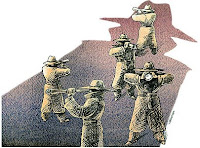 My former employer, the Canadian Security Intelligence Service (CSIS), released this week its 2007-2008 Public Report, in which, as it does every year, it provides an assessment of the threat environment and the organization’s priorities. As with every annual release, the report is an exercise in vagueness, and aside from the message from the director, Jim Judd, section, is almost verbatim what had been provided in previous reports from 2001 on. Given that CSIS tends to recycle and rehash information in not only its operational reports, but also in court affidavits and Federal Court warrants, it is no surprise that the unclassified annual report would fail to give new information.
My former employer, the Canadian Security Intelligence Service (CSIS), released this week its 2007-2008 Public Report, in which, as it does every year, it provides an assessment of the threat environment and the organization’s priorities. As with every annual release, the report is an exercise in vagueness, and aside from the message from the director, Jim Judd, section, is almost verbatim what had been provided in previous reports from 2001 on. Given that CSIS tends to recycle and rehash information in not only its operational reports, but also in court affidavits and Federal Court warrants, it is no surprise that the unclassified annual report would fail to give new information.As always, we are told that terrorism was the No. 1 investigative priority, followed by espionage and proliferation. Naturally, the report spends quite a bit of time on terrorism, mentioning the principal actors and countries where, since 9/11, terrorist attacks have been committed, while repeating, for the 6th year in a row, that al-Qaeda has singled Canada as an “important ally of the U.S. and is therefore deemed a legitimate target by the group.” It also writes that because of its participation in Afghanistan, Canada may appear as a legitimate target for attacks. While no Canadians have been targeted in recent years, the report tells us, it does not mean that the threat is any less, which, absent details, the reader must take on faith. Not a single reference is made to specific counterterrorism cases in Canada, except for the brief mention of the detonation of an explosive device outside a Jewish community center in Montreal in April 2007, which caused damage but no injuries. Including this incident in the terrorism section is actually misleading (and shows how little CSIS has to offer), as — to quote the Gazette newspaper — “The pair [of suspects] were arrested Thursday morning and questioned. The investigation did not turn up links to any terrorist or hate groups, said Constable Christian Emond, of the Montreal police fraud and arson squad.”
Stretching the definition of terrorism even further, the report continues:
Terrorism, however, remains a real threat to the safety and security of Canadians. Since the 9/11 attacks in the U.S (in which 24 Canadians were among those killed), there continue to be major terrorist acts committed across the globe. In Afghanistan, 301 Canadian soldiers were killed in 2007-08, most of them victims of improvised explosive devices … or roadside bombs.
Sad as the deaths of Canadian soldiers in Afghanistan are, they did not fall at the hands of terrorists, as they are a foreign military occupying another country. To refer to the deaths of Canadian soldiers in Afghanistan in its terrorism section is misleading and either underscores a lack of understanding of terrorism by the authors of the report, or a desire to muddy the water by making the threat of terrorism against Canadians seem more serious than it actually is.
The rest of the report is equally thin on specifics and does not provide anything new. In the espionage and foreign interference section, the usual intelligence-gathering activities of foreign powers — industrial espionage, cyber attacks, etc — are mentioned, but none of the principal suspects (China, Russia) are mentioned. Not even once. Nor are we given any information on actual foreign activities on Canadian soil. Instead, the report once again repeats the old “Canada as an ally of the US,” “Canada as an advanced industrialized country,” “Canada as a NATO member” as reasons why it is being targeted — with more sophistication and aggressiveness, the report claims.
The rest of the report is equally uninformative, with statistics on number of employees, gender representation, budget (C$389 million for FY2007-08), and donations to charity. A brief mention of the need for more review and accountability is made, but nothing is said about what CSIS or monitoring bodies, such as the Inspector General and SIRC, have done to ensure more transparency — except for CSIS’ outreach program, which is more an exercise in PR targeting academia and the media rather than a real means to ensure that CSIS act with honesty.
In all, with a few minor exceptions, someone who reads the 2007-08 report will not be learning anything new. I remembering memorizing, almost to the letter, the 2002-03 report during the many months I was involved in the hiring/screening process to become an intelligence officer at CSIS. Five years on, very little has changed …

2 comments:
"Muddy", not "muddle" the water, mate. :)
You planning on submitting this to the newspaper? You should.
Steve
Indeed, one "muddles through" while one "muddies the water." Thanks for catching that!
Had no plan to submit this to a paper. Canadian newspapers are struggling and are cutting on freelancers and so on. I'd already approached the Toronto Star and the Globe and Mail on the Kuo Kuan-ying affair and they informed me that they were not accepting submissions from freelancers at the moment.
Outside Canadian newspapers, I don't think the rest of the world cares about the CSIS report, though some my be interested to learn that CSIS director Jim Judd may be submitting his resignation (reason unknown) to PM Harper soon.
Post a Comment